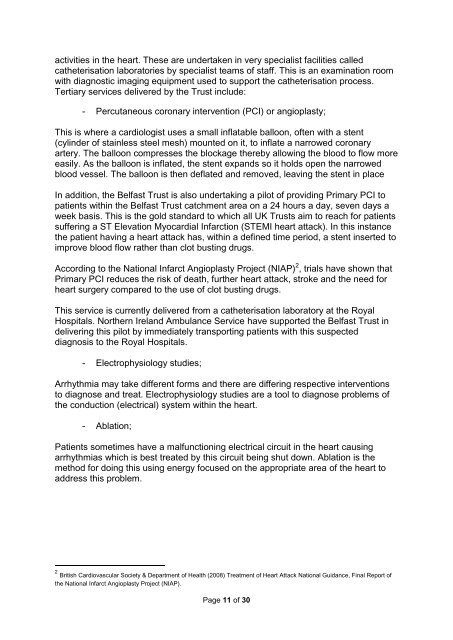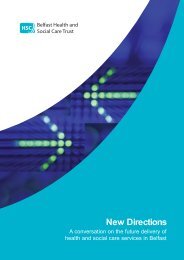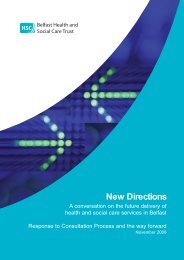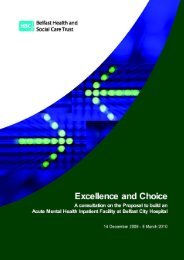Cardiology - Belfast Health and Social Care Trust
Cardiology - Belfast Health and Social Care Trust
Cardiology - Belfast Health and Social Care Trust
You also want an ePaper? Increase the reach of your titles
YUMPU automatically turns print PDFs into web optimized ePapers that Google loves.
activities in the heart. These are undertaken in very specialist facilities calledcatheterisation laboratories by specialist teams of staff. This is an examination roomwith diagnostic imaging equipment used to support the catheterisation process.Tertiary services delivered by the <strong>Trust</strong> include:- Percutaneous coronary intervention (PCI) or angioplasty;This is where a cardiologist uses a small inflatable balloon, often with a stent(cylinder of stainless steel mesh) mounted on it, to inflate a narrowed coronaryartery. The balloon compresses the blockage thereby allowing the blood to flow moreeasily. As the balloon is inflated, the stent exp<strong>and</strong>s so it holds open the narrowedblood vessel. The balloon is then deflated <strong>and</strong> removed, leaving the stent in placeIn addition, the <strong>Belfast</strong> <strong>Trust</strong> is also undertaking a pilot of providing Primary PCI topatients within the <strong>Belfast</strong> <strong>Trust</strong> catchment area on a 24 hours a day, seven days aweek basis. This is the gold st<strong>and</strong>ard to which all UK <strong>Trust</strong>s aim to reach for patientssuffering a ST Elevation Myocardial Infarction (STEMI heart attack). In this instancethe patient having a heart attack has, within a defined time period, a stent inserted toimprove blood flow rather than clot busting drugs.According to the National Infarct Angioplasty Project (NIAP) 2 , trials have shown thatPrimary PCI reduces the risk of death, further heart attack, stroke <strong>and</strong> the need forheart surgery compared to the use of clot busting drugs.This service is currently delivered from a catheterisation laboratory at the RoyalHospitals. Northern Irel<strong>and</strong> Ambulance Service have supported the <strong>Belfast</strong> <strong>Trust</strong> indelivering this pilot by immediately transporting patients with this suspecteddiagnosis to the Royal Hospitals.- Electrophysiology studies;Arrhythmia may take different forms <strong>and</strong> there are differing respective interventionsto diagnose <strong>and</strong> treat. Electrophysiology studies are a tool to diagnose problems ofthe conduction (electrical) system within the heart.- Ablation;Patients sometimes have a malfunctioning electrical circuit in the heart causingarrhythmias which is best treated by this circuit being shut down. Ablation is themethod for doing this using energy focused on the appropriate area of the heart toaddress this problem.2 British Cardiovascular Society & Department of <strong>Health</strong> (2008) Treatment of Heart Attack National Guidance, Final Report ofthe National Infarct Angioplasty Project (NIAP).Page 11 of 30
















